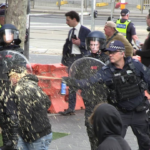When False Accusations Lead to Tragedy

When people make accusations against others, they normally think that they are justified.
A bit of sketchy information combined with emotions like frustration and anger can all work together to make a hunch seem like solid reality.
In trivial circumstances, the outcome of prejudgment like this might be minor. A teenager might be wrongly grounded for her friend’s misbehaviour, for example, or a club patron might be delayed at the door when mistaken for a banned individual.
But is it always just trivial when people make false accusations or offer an unsubstantiated opinion?
As recent history shows in Queensland, the outcome of such conduct can be tragic.
Deadly prejudgment
Sadly in some cases, making false and unproven accusations can lead to terrible consequences.
A chain of events in Brisbane involving a young woman, a car driver, police and the media all came together in such a way as to shatter the lives of at least two families.
A pretty young woman named Ashleigh Humphrys tragically died in the early hours of an autumn morning on a busy stretch of road in the leafy suburb of Toowong.
She had allegedly been lying or crawling on the road, intoxicated before the incident. Her injuries were consistent with a collision. Nobody came forward initially to claim any involvement in her death.
We saw Ashleigh’s young face smiling from the papers as media immediately leapt with outrage at the seemingly-obvious fact that this tragedy was the result of a criminal hit-and-run incident by a cowardly driver.
Even police initially assumed this, speaking openly to media about this “disgraceful act.”
Facts or possibilities?
With only the possibility of a dark sedan to go on, police spoke with a man who had been driving to work on the morning in question. He was cooperative but shocked and puzzled regarding the girl, having no idea that he might have hit a person at that time.
Now, some might roll their eyes collectively at such a statement. But for those living in the sub-tropical capital of Queensland, unfortunate bumps involving wildlife on the road can be a daily or weekly occurrence for many drivers. To have knocked or swiped a night-time creature is far from unusual.
North of the border, marsupials, toads, birds and feral cats can often come out second best as Brisbanites drive around their lush and steamy city. And the spot in question is at the base of one of the city’s best-preserved patches of forest and wildlife – Mt Coot-tha.
Add to this the confusion of witches hats, barriers and building materials currently associated with the construction of a tunnel adjacent to the accident site, and you can begin to see that the driver understood that his drive to work was a veritable obstacle course – and worse in the 4am dark.
Being sure of what we ‘know’
Even journalists who know this neck of the woods leapt straight to the throat of this unnamed man. Labelled a coward and the perpetrator of an abhorrent hit-and-run, this individual was seen by some sections of society to be a criminal of the worst kind for allegedly leaving Ms Humphrys on the road.
The ‘run’ in ‘hit-and-run’ of course points to immediate and full knowledge about a collision, as well as a clear decision to flee the scene.
The police and media had nothing to show that this happened. All we had was a sadly deceased young woman and an impounded sedan. The fellow driving appears to have been on his usual way to work, and while a typical bump or jolt might have occurred in that usual typical Brisbane nocturnal way, his journey was generally unremarkable.
With a vehicle hitting the unfortunate woman at approximately tyre level, there is every possibility that the event was nothing more and nothing less than a tragic accident.
Tragedy in waiting
As far as we know, the 57-year-old driver was completely cooperative with police and available to assist with anything that was needed.
Available, that is, until he took his own life after a few days of unrelenting prejudgment from all quarters.
Days of media and citizenry howls for the ‘coward’ to step forward no doubt served to horrify and confuse the man – a father himself.
Even the possibility of accidently hitting and killing a person would have been magnified by the strength and colour of the relentless accusations that were flung his way.
The problem with assumptions
What does this Brisbane tale tell us about unfounded accusations – particularly when a frenzy of ‘knowledge’ develops a frightening momentum?
We actually know nothing without a thorough and orderly examination of evidence, coupled with a deep understanding of the law. We know even less whenever we keep our minds closed.
The prejudgment that can occur in situations where a young life is taken – such as the sad case of Ashleigh Humphrys – can perhaps be seen as somewhat understandable.
Nevertheless, such negative suppositions should never be voiced by those in positions of great influence.
Lessons to be learned
With two people now deceased and the matter in the hands of the Coroner, truth is a thing that will hopefully one day be extracted from the unfortunate hype that dogged this sad case.
What we know is that when a person is falsely accused of an act or subjected to scurrilous opinions from outsiders, the damage can be extensive. Strain and sadness, fear and confusion can all mix to lead to incredible and cruel pressures on the accused person.
The media has an enormously powerful role to play as police begin any investigation – and this power should be wielded with care.
Police themselves might also need to refrain from providing accusatory public statements that are tainted with prejudgment: how do we know that an alleged act is “disgraceful” if the facts are not yet known?
With two lives so very sadly lost in the recent Humphrys matter, perhaps police and media will become a little slower in making false and unsubstantiated accusations.
Every person deserves the right to state their case, to be given professional advice from a criminal lawyer, and to have a fair chance of being heard.






